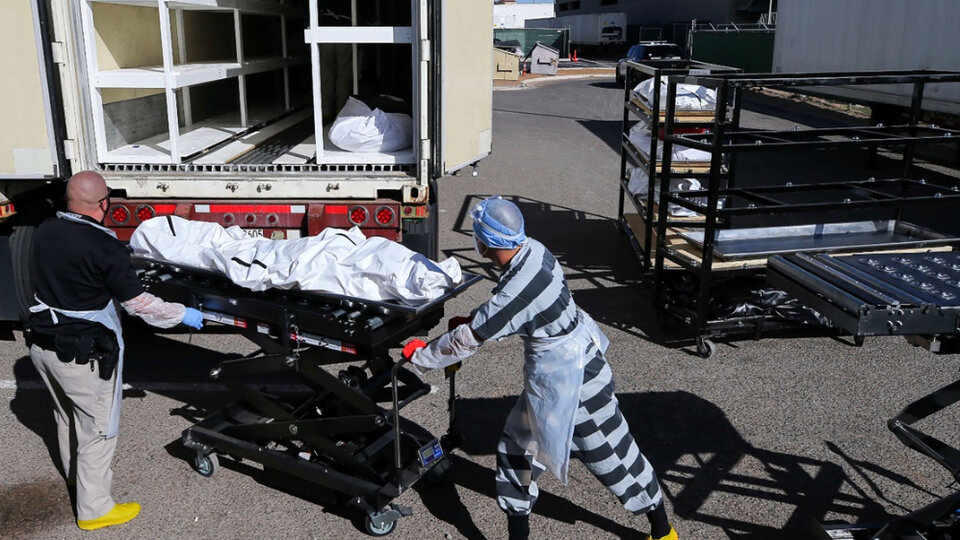
[ad_1]
Dressed in striped uniforms, protected by masks, gloves and goggles, El Paso prison inmates collaborate with local morgue officials, overwhelmed by influx of corpses. This American city succumbs to a flood of coronavirus cases.
Inmates are paid two dollars an hour for move the bodies in half a dozen refrigerated trailers set up outside the forensic office of El Paso, after the morgue in that city in the state of Texas ran out of space.
“If there is no staff, no one to help, and there are volunteers, even if they are detained, then that is the only option we have left,” said Ricardo Samaniego, a judge from El Paso County, on a local television station.
In two months, the number of Covid-19 cases has increased by 242% in the county. As of Wednesday, the total had reached over 77,000 and deaths to 804. This city in West Texas is now at the center of the epidemic in the United States.
More than 19% of Covid-19 tests are positive in El Paso, above the state average of 11%, 1% above the critical threshold of 10% set by Republican Governor Greg Abbott.
Last week, Texas became the first state in the country to exceed one million positive tests for the coronavirus since the start of the pandemic.
The last rites, now via Zoom
Tommy Zavala lost his father, Tomás, last week to covid-19.
Tomás was 82 years old and had breathing problems. He and his partner, Guadalupe, had given up all social activities months ago, they no longer saw their granddaughter and only left the house to shop or go to the doctor.
Every day, Guadalupe observed El Paso University Hospital, where her husband was admitted, from their house, which faces the building. But she was never able to visit him. The Zavalas managed to send a priest to the hospital room to give Tomás the last rites, which they were able to attend via Zoom. They do not yet know when they will be able to collect his body or organize a funeral.
Tommy Zavala himself contracted the virus in October, after his wife Erica showed symptoms upon returning from vacation at a rented house with friends.
Erica Salas, 41, who works for a mutula and describes herself as “very sociable”, has become aware of the severity of the pandemic in recent times.
At first, I thought the virus only affected the elderly or people with previous health problems, but I had an “epiphany” when a 39-year-old nurse friend died of covid-19.
Then she contracted the virus herself. Today, he no longer just obeys local restrictions, he “takes precautions” and no longer goes to bars and restaurants, even if they are allowed to remain open. “I survived, but I’m afraid for others,” he explains.
Without confinement
For nurse Lizette Torres, of Del Sol Medical Center in El Paso, “tighter restrictions” must be applied. On the contrary, “The health care system will not be able to handle the influx of patients.”
His union held a rally of horns in the city center on Monday evening to urge residents not to go out. For almost an hour, they paraded in cars displaying “Stay Home” and “Support the Nurses” posters. “We should have imposed full lockdown,” Torres said, saying nurses are “anxious” and “worried”.
El Paso hospitals house 1,052 patients with covid-19, or 49% of their total capacity. And there are 46 beds available in intensive care units in the area.
Faced with the health crisis in the region, Judge Ricardo Samaniego announced that he would extend his order to close non-essential businesses and stay at home until December 1. The order would be in effect during Thanksgiving celebrations, which he hoped would serve to curb the spread.
Samaniego has come under heavy criticism for ordering businesses to close, which caused a rift between state and local government officials. The same governor of Texas, Republican Greg Abbott, called the order “illegal.”
Several groups, including luxury restaurateurs, filed a lawsuit to end Judge Samaniego’s order and Texas Attorney General Ken Paxton overturned the order.
.
[ad_2]
Source link
 Naaju Breaking News, Live Updates, Latest Headlines, Viral News, Top Stories, Trending Topics, Videos
Naaju Breaking News, Live Updates, Latest Headlines, Viral News, Top Stories, Trending Topics, Videos